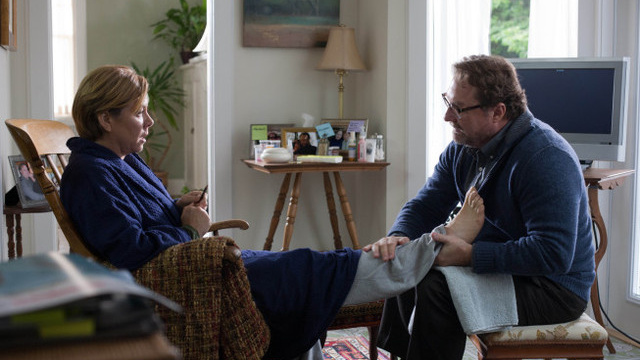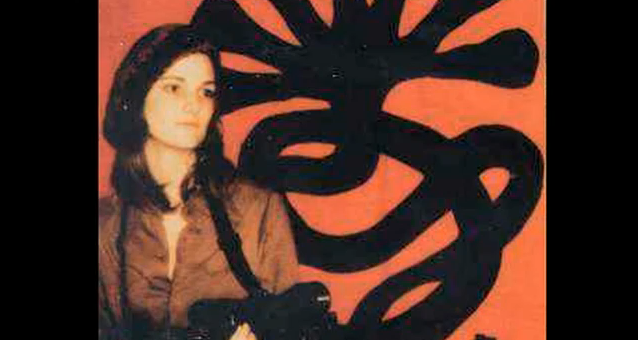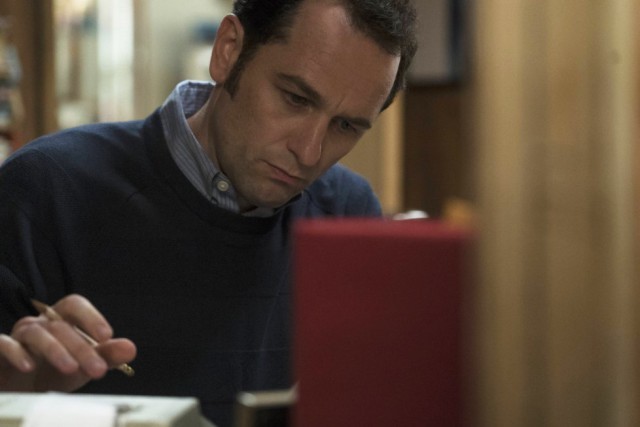
The Good Wife, Season 6, Episode 10: “The Trial”
Written by Robert King and Michelle King
Directed by Frederick E. O. Toye
Airs Sundays at 9pm ET
Simon Howell: Of course this was going to happen. The Good Wife’s latest seasonal pivot point, in which a major character apparently heads to the slammer, happens to be surrounded with a whole lot of its most broadly silly material. “The Trial” is up to a lot of things – shifting perspectives, light social commentary, romantic workplace comedy, Law & Order episode – but for the most part it manages to hold together reasonably well as an episode. If nothing else, it makes clear that the Kings have no interest in signposting just where this season is meant to be heading, except that it will continue to be defined by Alicia’s campaign and her increasingly unreliable ethical compass. To ponder the episode’s developments and assess the season so far, I’m joined by our esteemed TV editor (and similarly inclined Good Wife fan) Kate Kulzick. Kate, am I wrong to predict Cary having a horrible enough time in prison that he offers to flip on Bishop instead?
Kate Kulzick: You’re not wrong, but I don’t know if you’re right either. It depends on how constrained by the rules of television the series wants to become. While I love having Cary on the show (it’s been great seeing Matt Czuchry finally get something to play!), part of me would love to have this be his last episode as a regular, popping up occasionally when Alicia goes to visit him to get some guidance. If I were a betting woman though, and The Good Wife decided to go straightforward for once, I’d guess Cary will quietly do his time until something with Kalinda prompts him to flip, near the end of the season. Cary won’t turn on Bishop for himself, but he would for Kalinda, and with Bishop safely prosecuted and incarcerated, Cary could be exonerated and return to the firm, or run off into the sunset when Kalinda inevitably leaves at the end of the season.
Simon: I think you’re right to assume that Panjabi’s departure will factor into this somehow. That’s going to be unfortunate, though, if it means that Kalinda remains front and center, because I can’t help but be distracted by the whole her and Alicia never sharing a scene thing. I hate to harp on it, but the series keeps quietly pointing it out, as in this week, where Alicia is handed a shadowy envelope, which is then handed to Kalinda…presumably…offscreen? Though I do like the idea of Czuchry taking a backseat for the back half of the season, if only to let some other players (cough, Christine Baranski?) get something – anything – to do.
There’s been a lot to like in the Cary storyline – Mike Colter continues to be just great, especially in that scene opposite Panjabi as he towers over her in his kitchen, and the shifting perspectives, from David Paymer’s judge to the ADA to the juror (Zak Orth, formerly of the kinda-lamented Revolution) – but I really was struck by how much of everything else was just shy of over-the-top silly. Not only do we get the whole patronage story with Alicia penning a grotesquely violent (but, in my opinion, funny) note to one of Grace’s teachers, we also get the universe indicating that it wants Alicia and Finn to just get Biblical already. How have you been feeling about the approach to comedy this season
Kate: The series’ blending of comedy with its more dramatic moments continues to be a highlight and that’s certainly the case here, with much of the episode played purely for entertainment value, excepting the final sequence and the Kalinda/Bishop exchanges. Focusing on Paymer’s harried judge rather than Cary during the trial brings needed levity to the proceedings, which otherwise could have become oppressively dour. It also manipulates the audience into expecting a much different outcome for the trial, as does the behind the scenes drama at the prosecutor’s office. As soon as Geneva starts stumbling over her words in court, the resolution seems obvious: the prosecutor, distracted, will blunder and Cary will get off- tequila shots for everyone! Instead, the series holds true to Geneva’s sterling record and Cary runs out of options, and the audience pours themselves an Alicia-sized glass of red wine.
Speaking of the envelope (and I agree- the scene with Bishop and Kalinda is fantastic, with director Frederick E. O. Toye taking advantage of Colter’s performance and matching Kalinda’s boxing in of Bishop with his tight framing), how about a few words for its source? Not only is Finn and Alicia’s diner scene delightful, but the discomfort of Alicia’s initial intrusion on his ethics–because Finn Polmar is perhaps the show’s only ethical lawyer at this point, and he better stay that way, gosh darn it–by having him two steps ahead of Alicia with the envelope. It’s great that he already has what they need ready, and equally enticing to think of the fallout that may come from Kalinda’s decision to use the photos in this way. Were you happy with Finn and Alicia’s straightforward conversation at the office and is Alicia already a bad influence on Finn?
Simon: The fact that Alicia doesn’t take that much of a push to bend or break the rules seems like an excellent source of potential conflict for Finn and Alicia. The fact that he’s already doing things he almost certainly wouldn’t otherwise thanks to his fondness for her should be troubling for him, since, as you say, he’s one of the most upstanding characters she series has ever had. The Kings have done a great job of depicting their “handling” of the situation with a light touch, aided greatly by Margulies and Goode’s easy chemistry, but a little friction would go a long way. Getting Kalinda to convince Alicia to…Kalinda him?…would be an excellent first step for that. But as usual I’m getting ahead of myself, and the series.
By way of conclusion, I agree that the many little tonal gestures that mislead us as to the episode’s ultimate conclusion are really effective, and the way the episode underlines that the justice system is necessarily affected by a hundred miniscule biases is typically clever and convincing, but I am fairly certain now that this is destined to be “merely” a very good season of The Good Wife, on par with, say, seasons 3 and 4. The constraint that the Kings faced last year (Josh Charles’s departure) led them to some brilliant, revelatory places, but the handling of Panjabi’s final arc isn’t offering up developments on the same level, and moreover, it seems to have restricted their focus in ways I haven’t found totally satisfying. Are we on the same page here?
Kate: At the midseason finale (ish- fans will get two more episodes in January, then the last batch of 10 later), I’d have to agree. It makes sense for this to be somewhat of a rebuilding year- Will and Alicia’s arc in season five wouldn’t have been anywhere near as powerful without the years of shading that preceded it. While there are certainly enough threads to ratchet things back up in 2015 (most significantly for me, discovering just how significant of a connection Peter and Ramona share), for now it’s hard to argue that the series has set up an excellent premise for the season and merely executed it very well, rather than expertly.
Simon: I can get behind that. No need to give them too hard a time – if this season seems less than mind-blowing, that’s only because season 5 torched the rulebook. I have faith they’ll hit some of those heights again before the series runs its course. Thanks for your input, Kate, and, as per usual, a few…
Other thoughts:
- As this was a Kings-penned episode, there are many, many bon mots to be had, but the line reading of the episode has to go to dark horse Steven Pasquale, who finally justifies Elfman’s existence with his expertly lame hypothetical defense of Alicia’s murder note: “She wrote it as an example of the thing…not to…something.”
- Paymer’s judge may have railroaded Cary, but at least we got his rendition of “Sweet Caroline.” Justice is served!
- “We talk about the law. With accordion music.”
- “I trust assassins over teachers!” Of course Eli hates teachers.
- “I think I’m angry.” While sassy Cary has been missed, Matt Czuchry has done a stellar job of inhabiting Cary’s fear and rage.
- See you again in January.



